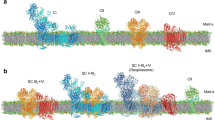Abstract
Arising from J. E. Kravchenko, I. B. Rogozin, E. V. Koonin & P. M. Chumakov Nature 436, 735–739 (2005); doi:10.1038/nature0384810.1038/nature03848
Mitochondria are involved in a variety of metabolic processes and one of their main functions is to perform oxidative phosphorylation1,2, which requires a crosstalk between the mitochondrial and nuclear genomes to accomplish coordinated gene expression3,4. Splice variants of the mitochondrial RNA polymerase gene (Polrmt) have been reported to encode a nuclear RNA polymerase isoform (spRNAP-IV), which is thought to facilitate this coordination by transcribing a specific subset of nuclear genes5,6,7. Here we report that analysis of Polrmt gene expression, subcellular fractionation and fluorescence microscopy do not support the existence of a nuclear POLRMT isoform in mouse and human cells, and that conditional knockout of Polrmt does not affect expression of the nuclear genes previously reported to be transcribed by spRNAP-IV. We thus conclude that POLRMT has an exclusive mitochondrial role and that it is absolutely required for expression of mitochondrial DNA (mtDNA) in mammalian mitochondria.











Similar content being viewed by others
References
Falkenberg, M., Larsson, N.-G. & Gustafsson, C. M. DNA replication and transcription in mammalian mitochondria. Annu. Rev. Biochem. 76, 679–699 (2007)
Park, C. B. & Larsson, N.-G. Mitochondrial DNA mutations in disease and aging. J. Cell Biol. 193, 809–818 (2011)
Liu, Z. & Butow, R. A. Mitochondrial retrograde signaling. Annu. Rev. Genet. 40, 159–185 (2006)
Ryan, M. T. & Hoogenraad, N. J. Mitochondrial-nuclear communications. Annu. Rev. Biochem. 76, 701–722 (2007)
Kravchenko, J. E., Rogozin, I. B., Koonin, E. V. & Chumakov, P. M. Transcription of mammalian messenger RNAs by a nuclear RNA polymerase of mitochondrial origin. Nature 436, 735–739 (2005)
Lee, Y.-L., Chiao, C.-H. & Hsu, M.-T. Transcription of muscle actin genes by a nuclear form of mitochondrial RNA polymerase. PLoS ONE 6, e22583 (2011)
Kravchenko, J. E. & Chumakov, P. M. Alternative transcripts of POLRMT gene coding for nuclear RNA polymerase IV. Mol. Biol. (Mosk.) 39, 67–71 (2005)
Arai, M., Matsui, H. & Periasamy, M. Sarcoplasmic reticulum gene expression in cardiac hypertrophy and heart failure. Circ. Res. 74, 555–564 (1994)
Ringel, R. et al. Structure of human mitochondrial RNA polymerase. Nature 478, 269–273 (2011)
Shi, Y. et al. Mammalian transcription factor A is a core component of the mitochondrial transcription machinery. Proc. Natl Acad. Sci. USA 109, 16510–16515 (2012)
Schwinghammer, K. et al. Structure of human mitochondrial RNA polymerase elongation complex. Nature Struct. Mol. Biol. 20, 1298–1303 (2013)
Milenkovic, D. et al. TWINKLE is an essential mitochondrial helicase required for synthesis of nascent D-loop strands and complete mtDNA replication. Hum. Mol. Genet. 22, 1983–1993 (2013)
Metodiev, M. D. et al. Methylation of 12S rRNA is necessary for in vivo stability of the small subunit of the mammalian mitochondrial ribosome. Cell Metab. 9, 386–397 (2009)
Ruzzenente, B. et al. LRPPRC is necessary for polyadenylation and coordination of translation of mitochondrial mRNAs. EMBO J. 31, 443–456 (2012)
Cox, B. & Emili, A. Tissue subcellular fractionation and protein extraction for use in mass-spectrometry-based proteomics. Nature Protocols 1, 1872–1878 (2006)
Author information
Authors and Affiliations
Contributions
C.Ku. did microscopic analysis; B.R., D.M., M.M. and A.M. helped with experimental work and were involved in project planning; C.Ko. performed mouse breedings; M.F. produced the recombinant POLRMT protein used for antibody production; and I.K. performed experimental work, project planning, data analysis and wrote the manuscript together with N.-G.L.
Corresponding author
Ethics declarations
Competing interests
Competing Financial Interests Declared none.
PowerPoint slides
Rights and permissions
About this article
Cite this article
Kühl, I., Kukat, C., Ruzzenente, B. et al. POLRMT does not transcribe nuclear genes. Nature 514, E7–E11 (2014). https://doi.org/10.1038/nature13690
Received:
Accepted:
Published:
Issue Date:
DOI: https://doi.org/10.1038/nature13690
- Springer Nature Limited
This article is cited by
-
Mechanisms and regulation of human mitochondrial transcription
Nature Reviews Molecular Cell Biology (2024)
-
Extreme heterogeneity of human mitochondrial DNA from organelles to populations
Nature Reviews Genetics (2021)
-
POLRMT mutations impair mitochondrial transcription causing neurological disease
Nature Communications (2021)
-
Small-molecule inhibitors of human mitochondrial DNA transcription
Nature (2020)
-
LRPPRC-mediated folding of the mitochondrial transcriptome
Nature Communications (2017)





